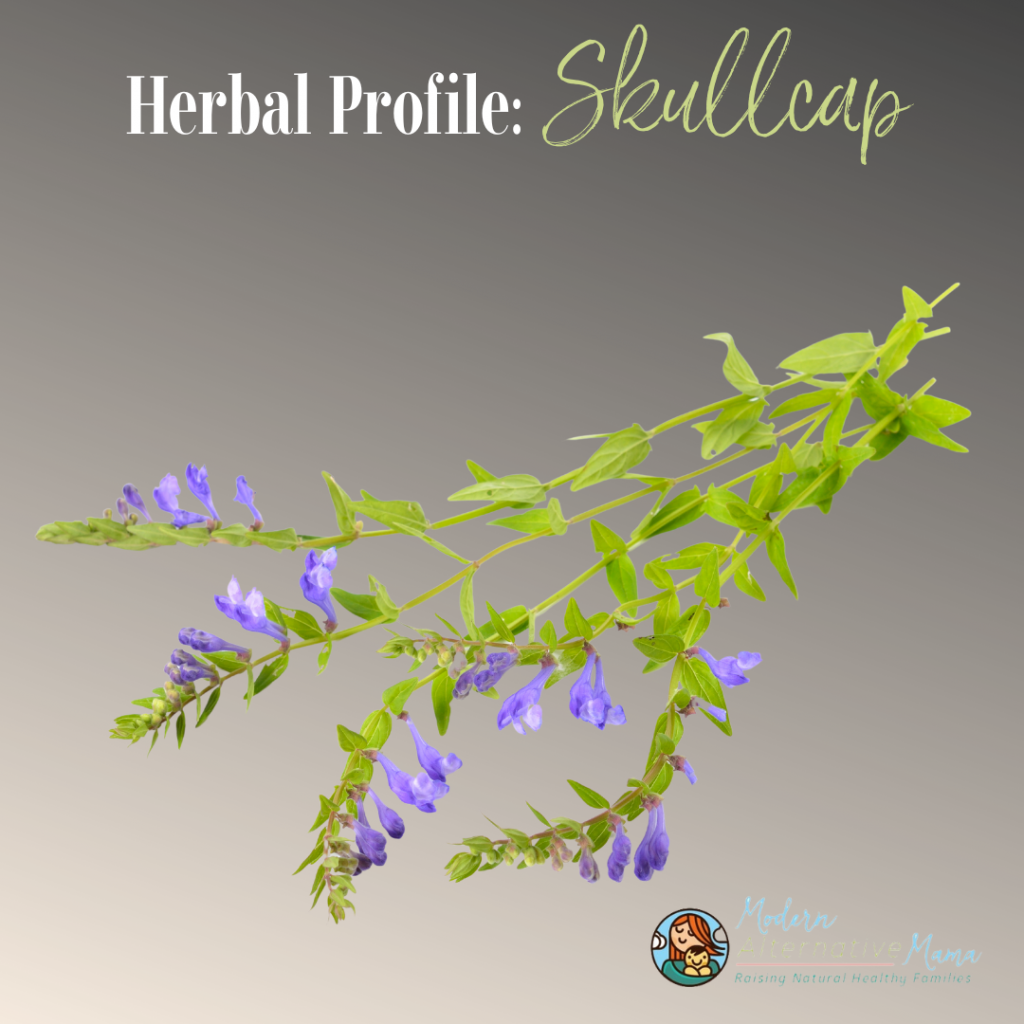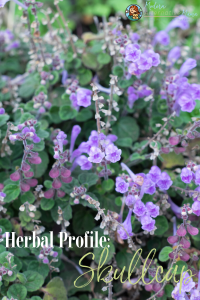What is Skullcap
Skullcap also known as Virginian skull cap, Mad-dog skull cap, or its scientific name Scutellaria lateriflora is a part of the Lamiaceae or Mint Family. Skullcap is a delicate blue/violet, tube-like flower with a square stem and oval leaves commonly found in England and Wales with roughly 350 species worldwide (1). Many get skullcap confused with the highly poisonous mushroom, death cap, but skullcap is safe to consume, even in high doses.
Health Benefits of Skullcap
Various parts of the skullcap plant have been used in traditional Chinese and Native American medicine to treat various ailments, including but not limited to:
May Reduce Anxiety
Twenty percent of American adults are affected by anxiety (2). Researchers believe that skullcap positively impacts mood and reduces anxiety by stimulating gamma-aminobutyric acid (GABA), a neurotransmitter that helps calm nerves (3). In fact, many anti-anxiety pharmaceutical medications work by enhancing GABA activity (4). One study found that those who received 1,050 mg of American skullcap daily for two weeks reported significant enhancements in mood compared to the placebo group (5).
May Promote Sleep & Relieve Insomnia
It’s said that 70 million adults in the United States experience sleep disorder symptoms; more than half of them experience insomnia, with another 10 to 15 percent being chronic (5). Thankfully skullcap is an anxiolytic (anti-anxiety) herb that can help. Studies have found that the way skullcap positively influences mood and eases anxiety by stimulating gamma-aminobutyric acid (GABA) can also help calm nerves and promote sleep (3).
In traditional herbal medicine, skullcap has been used as a sedative, especially for insomniacs (6). One study showed that skullcap extract improved sleep (7). Another study found skullcap decreases slow wave sleep during the first two hours of light sleep without altering REM (rapid eye movement) sleep (8). This means the skullcap demonstrated biphasic effects on sleep-wake regulation. I highly recommend Earthley’s Sleepy Time for these benefits.
Antibacterial Properties
An antibacterial property is when a substance, or in this case, an herb, can destroy or suppress the growth and reproduction of bacteria (9). Test-tube studies have found that only skullcap extract demonstrated 100% antibacterial activity against Acinetobacter baumannii (XDRAB) while effectively reducing the bacterial load in the lungs of mice, compared to a control group (10). XDRAB is a drug-resistant bacterium that is a leading cause of pneumonia in hospitalized patients (11). Additionally, when added to an herbal mixture known as Candactin, skullcap is purported to have antibacterial effects robust enough to remedy intestinal bacterial overgrowth (12).
Anti-Inflammatory Properties
Skullcap is an effective way to combat inflammation. Chronic inflammation has been linked with many diseases, such as type 2 diabetes, asthma, and certain cancers (13). Researchers found ginger and turmeric extracts exhibited the most protective effects, followed by skullcap, ginkgo biloba, Chinese cinnamon, and Korean rhubarb (14). Additionally, animal studies reveal that a flavonoid compound in skullcap, known as wogonin, is particularly effective in treating inflammatory allergic conditions like allergic rhinitis (15,16).
May Support Heart Health
Unfortunately, heart disease is the world’s number 1 cause of death (17). Due to the incredibly complex determinants of heart disease and various possible contributions, it’s hard to pinpoint an exact way to prevent it. Still, you can at least take steps to lower your overall risk. That’s where skullcap may help. One study demonstrated the cardioprotective effects of skullcap, giving evidence that pretreatment could prevent and possibly terminate myocardial infarction and other heart disease conditions (18). Additionally, an animal study found skullcap injections significantly reduced damage associated with an induced heart attack (19).
Anticonvulsant Properties
Anticonvulsants help people with epilepsy manage their seizures and may even help with nerve pain (20). In animal studies, oral supplementation of skullcap has been shown to have anticonvulsant effects in rodents (21,22). Additionally, an herbal cocktail combining 18 healing Ayurvedic ingredients helped to reduce tremors, muscle spasms, nerve-related symptoms, and headaches in epileptic patients (23).
Neuroprotective Properties
Neuroprotective properties inhibit neuronal cell death by intervening in the pathogenetic cascade, resulting in cell dysfunction and eventual death (24). Test-tube studies suggest that skullcap has neuroprotective properties, potentially protecting against diseases like Alzheimer’s and Parkinson’s (25,26). Another study discussed the protective effects of skullcap and used it as a treatment for neurotoxicity-related diseases such as ischemic stroke, Alzheimer’s, and Parkinson’s (27).
Anticancer Properties
Statistics say that 158.3 of every 100,000 individuals will die from cancer, but what if they didn’t have to (28)? Scutellarein is a compound in skullcap that exhibits potent anticancer potential in test-tube studies (29). For example, in test-tube studies, baicalin induced cell death in prostate and cervical cancer cells while significantly inhibiting the growth of ovarian and pancreatic cancer cells (30).
Safety Concerns
The mainstream narrative will tell you to avoid skullcap if you have any condition that might worsen by estrogen. Maybe that’s because skullcap has been widely used by the Eclectic physicians of the 18th and 19th centuries for various female disorders in pregnant and non-pregnant women.
As per trusted herbalist Richard Whelan, skullcap is very safe to use, even in high doses, for the young and old, and during pregnancy and breastfeeding. He mentions that his own clinical use of Skullcap, substantial amounts, like tea, can have quite a striking calming effect on the mind of agitated individuals. These calming effects are commonly the point of using skullcap, but for someone who is not used to this kind of effect (and maybe expecting a relatively mild action), this can shock the system (31).
How to Use Skullcap
You can find skullcap in dried bulk, teas, capsules, powders, extracts, essential oils, and even herbal tinctures. Tinctures always contain the most concentrated amount of herbs. Teas are also an option. If you’re a DIY person, some great starter recipes are:
Follow the recommendations of any supplement; some of my recommendations include:
- Earthley’s Sleepy Time is a combination of three powerful yet gentle herbs that promote restful sleep and peaceful nights. This herbal tincture is the perfect natural solution for the whole family.
Disclaimer: This post is not intended as medical advice. These statements have not been evaluated by the FDA, and nothing in this post is intended to diagnose, treat, or cure anything. If you have questions, please do your own research or seek advice from a health professional.







